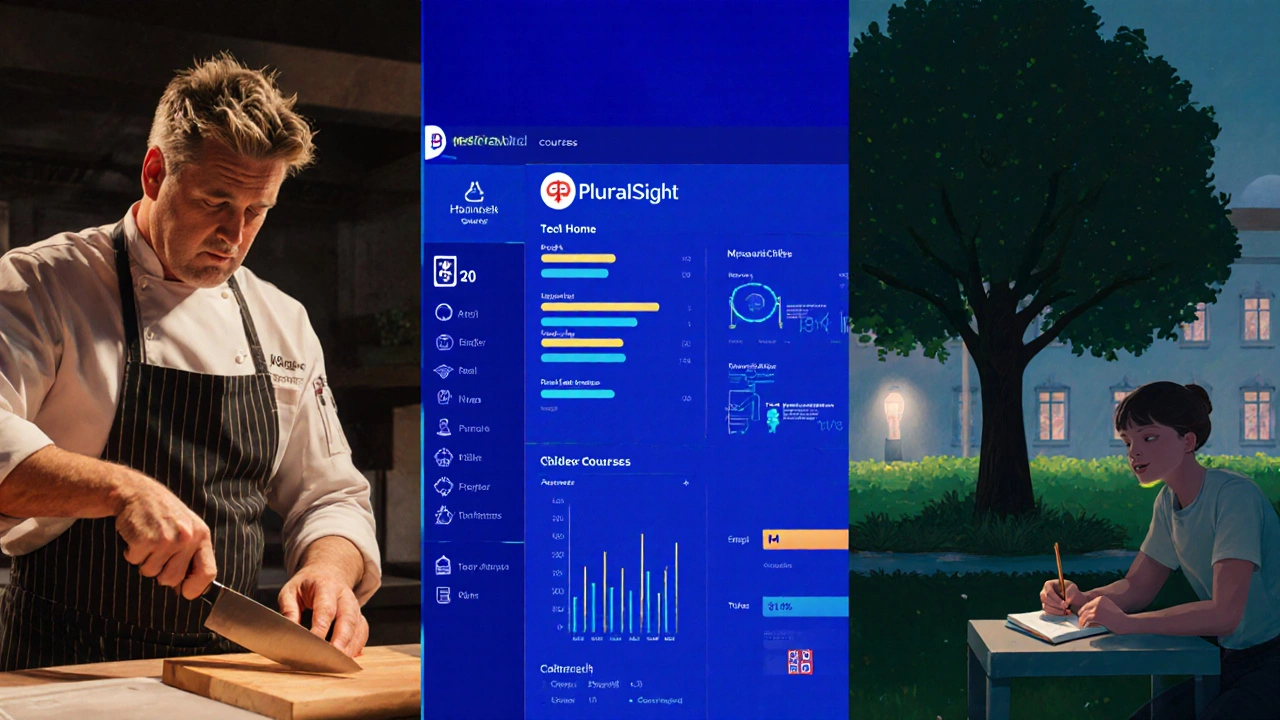There are hundreds of eLearning platforms out there. But if you’re trying to pick the best one for your needs - whether you’re a student, a professional upskilling, or a company training teams - you’re not just looking for a website with videos. You’re looking for something that actually works for you.
What makes an eLearning platform truly "best"?
There’s no single winner. The "best" platform depends on what you’re trying to learn, how you learn it, and what tools you need to stay on track. Some platforms are built for corporate training. Others are made for coding bootcamps. A few focus on university-style degrees. And some are just great for casual learners who want to pick up a new skill on weekends.
Here’s what actually matters when you’re choosing:
- Course quality - Are the instructors real experts? Or just good marketers?
- Learning structure - Do lessons build logically? Is there practice, feedback, or projects?
- Mobile access - Can you learn on your phone during your commute?
- Certifications - Will this help your resume or LinkedIn profile?
- Support - Can you get help when you’re stuck?
- Cost - Is it worth the price? Or are you paying for branding?
Platforms that score high on all of these tend to stand out. Let’s look at the top contenders in 2025.
Coursera: The university-backed option
Coursera partners with 200+ universities and companies like Google, IBM, and Yale. That means you can earn certificates from Stanford, take a data science course from IBM, or even complete a full Master’s degree online - all with official accreditation.
What sets Coursera apart is its depth. Need to learn Python for data analysis? There’s a 6-month specialization with hands-on projects, peer-reviewed assignments, and a capstone. Want to become a project manager? They offer a certificate recognized by PMI.
The downside? It’s expensive if you pay full price. But most courses offer a 7-day free trial, and financial aid is available. Many learners use the free audit option to access content, then pay only for the certificate if they need it.
Best for: Professionals seeking accredited credentials, learners who want university-level rigor.
Udemy: The marketplace of choices
Udemy has over 215,000 courses on every topic imaginable - from TikTok marketing to quantum computing basics. It’s not about prestige. It’s about variety.
Anyone can create a course here. That means you’ll find amazing teachers who’ve built real businesses - and others who are just repackaging free YouTube content.
The trick? Read reviews. Look for courses with 4.5+ stars and at least 1,000 students. Check if the instructor responds to questions. Avoid courses with outdated content (look for last updated dates).
Udemy’s big win? Sales. You can often buy top courses for under $15. That’s cheaper than a coffee. It’s perfect for trying out new skills without commitment.
Best for: Hobbyists, freelancers, people who want to test ideas before going deep.
LinkedIn Learning: Built for career growth
If you’re on LinkedIn, you already have a profile. LinkedIn Learning integrates directly with it. When you finish a course, it automatically adds the skill to your profile. Recruiters see it. That’s powerful.
The courses are short, practical, and focused on workplace skills: Excel formulas, Slack workflows, negotiation tactics, AI tools for marketers. Instructors are industry practitioners, not academics.
It’s included with a LinkedIn Premium subscription ($29.99/month). If you’re already paying for Premium, this is essentially free. If not, you can get a 1-month free trial.
Best for: Professionals who want to boost their LinkedIn profile, employees needing quick upskilling.

Pluralsight: The tech specialist
Pluralsight is the go-to for software developers, IT admins, and cybersecurity pros. It’s not for beginners learning to write their first HTML tag. It’s for people who already know the basics and want to level up.
Its skill assessments are unique. You take a 5-minute quiz, and Pluralsight tells you exactly where you stand - and which courses to take next. It tracks your progress over time and even compares your skills to industry benchmarks.
They have deep content on AWS, Azure, Kubernetes, React, Python automation, and more. If you’re aiming for a cloud certification or want to master DevOps, this is one of the few platforms that gets you there without fluff.
Best for: Tech professionals, developers, IT teams needing structured upskilling.
edX: The non-profit alternative
Founded by Harvard and MIT, edX was built to make elite education accessible. It still feels different - more academic, less salesy.
You’ll find microMasters programs from top schools like MIT and Berkeley. These are graduate-level courses that can count toward a full degree. Many are free to audit. You only pay if you want the verified certificate.
edX also partners with governments and NGOs to offer free courses on climate change, public health, and sustainable development. If you care about learning with purpose, this is the platform for you.
Best for: Lifelong learners, students aiming for degrees, people interested in global issues.
MasterClass: For inspiration, not skills
MasterClass isn’t a traditional learning platform. You won’t find quizzes or assignments. Instead, you get 90-minute video lessons from celebrities like Gordon Ramsay, Serena Williams, and Neil Gaiman.
It’s not about becoming a chef or a writer. It’s about understanding how top performers think. The production value is cinematic. The insights are raw and personal.
If you need motivation, perspective, or creative sparks - this is powerful. But if you want to build a portfolio, earn a certificate, or get feedback - skip it.
Best for: Creative professionals, people seeking inspiration, non-technical learners.

Which one should you choose?
Here’s a quick decision guide:
| Your Goal | Best Platform | Why |
|---|---|---|
| Get a university-recognized certificate | Coursera or edX | Accredited programs from top schools |
| Learn a new tech skill fast | Pluralsight | Assessments + targeted learning paths |
| Boost your LinkedIn profile | LinkedIn Learning | Auto-adds skills to your profile |
| Try something new for under $20 | Udemy | Massive variety, frequent sales |
| Get inspired by experts | MasterClass | Story-driven, high-production lessons |
| Learn for free, no pressure | edX or Coursera (audit) | Free access to real university content |
Common mistakes to avoid
People pick platforms based on popularity - not fit. Here’s what goes wrong:
- Buying a $200 course without checking reviews - You’ll end up with outdated content or a teacher who doesn’t respond to questions.
- Enrolling in too many courses at once - You’ll finish zero. Pick one. Stick with it.
- Ignoring mobile access - If you can’t learn on your phone, you won’t.
- Not using free trials - Most platforms let you test for 7-14 days. Use them.
- Thinking certificates = job offers - A certificate helps. But real skills, projects, and portfolios matter more.
What’s new in 2025?
AI is changing everything. Platforms like Coursera and Udemy now offer AI tutors that give instant feedback on your coding or writing. Some even simulate job interviews based on your resume.
Micro-credentials are exploding. Instead of a 6-month course, you can now earn a 3-hour badge in Excel pivot tables or Google Ads optimization - and add it directly to your LinkedIn profile.
Corporate learning platforms like Degreed and Docebo are integrating with Slack and Microsoft Teams. You can learn during your workday without switching apps.
Final tip: Start small, then scale
Don’t try to pick the "best" platform on day one. Try one free course on three different platforms. See which one keeps you engaged. Which one makes you want to come back?
That’s your signal. The best platform isn’t the most expensive or the most famous. It’s the one you actually use.
Is there a free eLearning platform that’s actually good?
Yes. edX and Coursera let you audit most courses for free. You won’t get a certificate or graded assignments, but you’ll get full access to videos, readings, and sometimes quizzes. Khan Academy is also excellent for math, science, and economics - and 100% free. YouTube channels like freeCodeCamp and CrashCourse offer university-level content without any cost.
Can I get a job with just an online certificate?
It depends. A certificate alone won’t land you a job. But if you pair it with a portfolio - like a GitHub repo for coding, a sample marketing campaign for digital marketing, or a case study for project management - you become a strong candidate. Employers care more about what you can do than what you’ve been taught.
Which platform is best for learning coding?
For beginners, freeCodeCamp and Codecademy are great starting points. For serious developers, Pluralsight and Udemy’s top-rated courses (like Angela Yu’s Web Development Bootcamp) offer deeper, project-based learning. Coursera’s "Python for Everybody" by the University of Michigan is also highly recommended for beginners.
Do companies recognize online certificates?
Yes - especially from Coursera, edX, and LinkedIn Learning. Google, IBM, and Microsoft certifications on these platforms are widely accepted. Many Fortune 500 companies have partnerships with Coursera and use it for internal training. For tech roles, Pluralsight skills are often checked during interviews.
Should I pay for a subscription or buy courses individually?
If you plan to take 3+ courses in a year, a subscription (like LinkedIn Learning or Pluralsight) saves money. If you’re only learning one or two things, buying individual courses on Udemy during sales is smarter. Always wait for a sale - most platforms drop prices to $10-$15 every few weeks.

